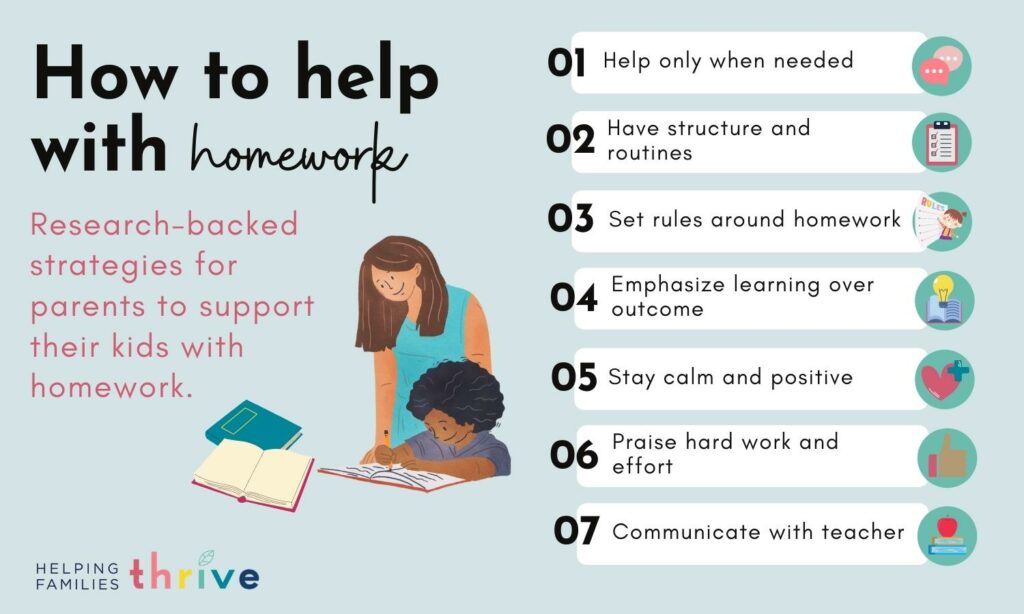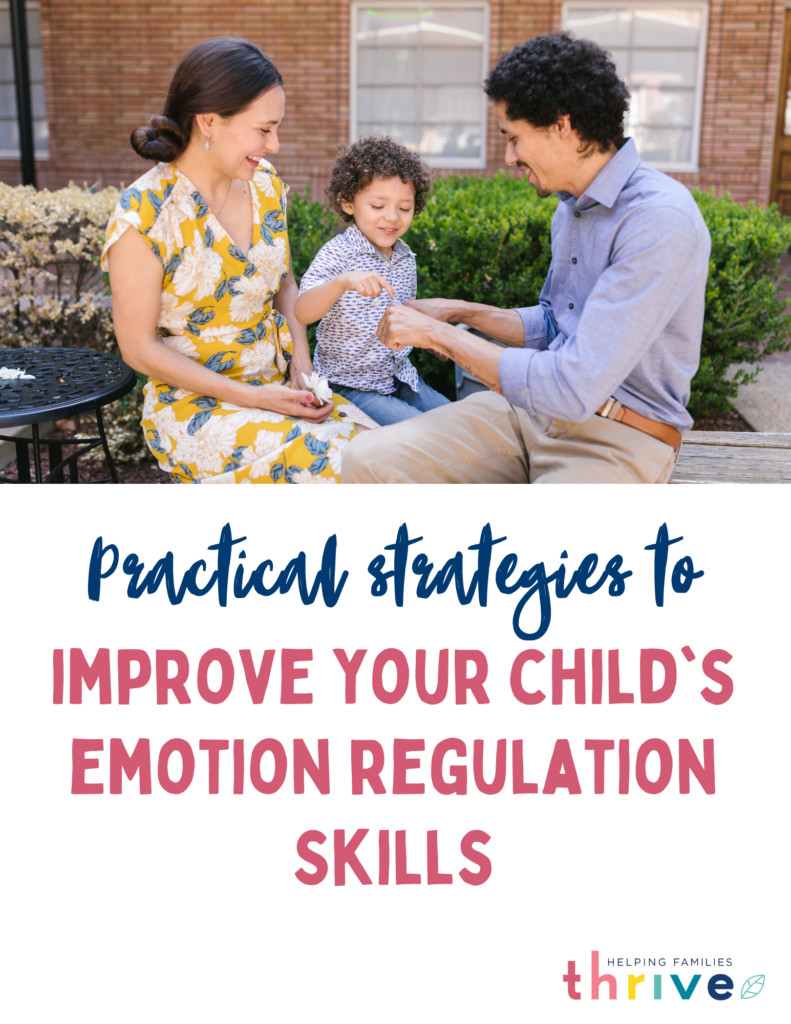
Homework. A single word that for many brings up memories of childhood stress. Now that you’re a parent, you may be reminded of that feeling every time your child spills their backpack across the table. You also may be questioning how much homework is too much and wondering how you can best help your child with their schoolwork.
Here, Dr. Cara Goodwin of Parenting Translator explains what the research actually says about homework. She outlines specific ways parents can support their kids to maximize the academic benefits and develop lifelong skills in time management and persistence.
In recent years, many parents and educators have raised concerns about homework. Specifically, they have questioned how much it enhances learning and if its benefits outweigh potential costs, such as stress to the family.
So, what does the research say?
Academic benefits vs risks of homework
One of the most important questions when it comes to homework is whether it actually helps kids understand the content better. So does it? Research finds that homework is associated with higher scores on academic standardized tests for middle and high school students, but not for elementary school students (1, 2).
In other words, homework seems to have little impact on learning in elementary school students.
Additionally, a 2012 study found that while homework is related to higher standardized test scores for high schoolers, it is not related to higher grades.
Not surprisingly, homework is more likely to be associated with improved academic performance when students and teachers find the homework to be meaningful or relevant, according to several studies (1, 3, 4). Students tend to find homework to be most engaging when it involves solving real-world problems (5).
The impact of homework may also depend on socioeconomic status. Students from higher income families show improved academic skills with more homework and gain more knowledge from homework, according to research. On the other hand, the academic performance of more disadvantaged children seems to be unaffected by homework (6, 7). This may be because homework provides additional stress for disadvantaged children. They are less likely to get help from their parents on homework and more likely to be punished by teachers for not completing it (8).
Non-academic benefits vs risks of homework
Academic outcomes are only part of the picture. It is important to look at how homework affects kids in ways other than grades and test scores.
Homework appears to have benefits beyond improving academic skills, particularly for younger students. These benefits include building responsibility, time management skills, and persistence (1, 9, 10). In addition, homework may also increase parents’ involvement in their children’s schooling (11, 12, 13, 14).
Yet, studies show that too much homework has drawbacks. It can reduce children’s opportunities for free play, which is essential for the development of language, cognitive, self-regulation, and social-emotional skills (15). It may also interfere with physical activity, and too much homework is associated with an increased risk for being overweight (16, 17).
In addition to homework reducing opportunities for play, it also leads to increased conflicts and stress for families. For example, research finds that children with more hours of homework experience more academic stress, physical health problems, and lack of balance in their lives (18).
Clearly, more is not better when it comes to homework.
What is the “right” amount of homework?
Recent reports indicate that elementary school students are assigned three times the recommended amount of homework. Even kindergarten students report an average of 25 minutes of homework per day (19).
Additionally, the National Assessment of Educational Progress (NAEP) found that homework has been increasing in recent years for younger students. Specifically, 35% of 9-year-olds reported that they did not do homework the previous night in 1984 versus 22% of 9-years-old in 2012. However, homework levels have stayed relatively stable for 13- and 17-year-olds during this same time period.
Research suggests that homework should not exceed 1.5 to 2.5 hours per night for high school students and no more than 1 hour per night for middle school students (1). Homework for elementary school students should be minimal and assigned with the aim of building self-regulation and independent work skills. A common rule, supported by both the National Education Association (NEA) and National Parent Teacher Association (PTA), is 10-minutes of homework per grade in elementary school. Any more than this and homework may no longer have a positive impact. Importantly, the NEA and the National PTA do not endorse homework for kindergarteners.
How can parents best help with homework?
Most parents feel that they are expected to be involved in their children’s homework (20). Yet, it is often unclear exactly how to be involved in a way that helps your child to successfully complete the assignment without taking over entirely. Most studies find that parental help is important but that it matters more HOW the parent is helping rather than how OFTEN the parent is helping (21).
While this can all feel very overwhelming for parents, there are some simple guidelines you can follow to ease the homework burden and best support your child’s learning.
1. Help only when needed.
Parents should focus on providing general monitoring, guidance and encouragement. Allow children to generate answers on their own and complete their homework as independently as possible. This is important because research shows that allowing children more independence in completing homework benefits their academic skills (22, 23). In addition, too much parent involvement and being controlling with homework is associated with worse academic performance (21, 24, 25).
What does this look like?
- Be present when your child is completing homework to help them to understand the directions.
- Be available to answer simple questions and to provide praise for their effort and hard work.
- Only provide help when your child asks for it and step away whenever possible.
2. Have structure and routines.
Help your child create structure and to develop some routines. This helps children become more independent in completing their homework. Research finds that providing this type of structure and responsiveness is related to improved academic skills (25).
This structure may include:
- A regular time and place for homework that is free from distractions.
- Have all of the materials they need within arm’s reach.
- Teach and encourage kids to create a checklist for their homework tasks each day.
Parents can also help their children to find ways to stay motivated. For example, developing their own reward system or creating a homework schedule with breaks for fun activities.
3. Set specific rules around homework.
Research finds that parents setting rules around homework is related to higher academic performance (26). For example, parents may require that children finish homework before screen time or may require children to stop doing homework and go to sleep at a certain hour.
4. Emphasize learning over outcome.
Encourage your child to persist in challenging assignments and frame difficult assignments as opportunities to grow. Research finds that this attitude is associated with student success (20). Research also indicates that more challenging homework is associated with enhanced school performance (27).
Additionally, help your child to view homework as an opportunity to learn and improve skills. Parents who view homework as a learning opportunity rather than something that they must get “right” or complete successfully to obtain a higher grade are more likely to have children with the same attitudes (28).
5. Stay calm and positive.
Yes, we know this is easier said than done, but it does have a big impact on how kids persevere when things get hard! Research shows that mothers showing positive emotions while helping with homework may improve children’s motivation in homework (29)
6. Praise hard work and effort.
Praise focused on effort is likely to increase motivation (30). In addition, research finds that putting more effort into homework may be associated with enhanced development of conscientiousness in children (31).
7. Communicate with your child’s teacher.
Let your child’s teacher know about any problems your child has with homework and the teachers’ learning goals. Research finds that open communication about homework is associated with improved school performance (32).

In summary, research finds that homework provides some academic benefit for middle- and high-school students but is less beneficial for elementary school students. As a parent, how you are involved in your child’s homework really matters. By following these evidence-based tips, you can help your child to maximize the benefits of homework and make the process less painful for all involved!
For more resources, take a look at our recent posts on natural and logical consequences and simple ways to decrease challenging behaviors.
References
- Cooper, H., Robinson, J. C., & Patall, E. A. (2006). Does homework improve academic achievement? A synthesis of research, 1987–2003. Review of educational research, 76(1), 1-62.
- Muhlenbruck, L., Cooper, H., Nye, B., & Lindsay, J. J. (1999). Homework and achievement: Explaining the different strengths of relation at the elementary and secondary school levels. Social Psychology of Education, 3(4), 295-317.
- Marzano, R. J., & Pickering, D. J. (2007). Special topic: The case for and against homework. Educational leadership, 64(6), 74-79.
- Trautwein, U., Lüdtke, O., Schnyder, I., & Niggli, A. (2006). Predicting homework effort: support for a domain-specific, multilevel homework model. Journal of educational psychology, 98(2), 438.
- Shernoff, D. J., Csikszentmihalyi, M., Schneider, B., & Shernoff, E. S. (2014). Student engagement in high school classrooms from the perspective of flow theory. In Applications of flow in human development and education (pp. 475-494). Springer, Dordrecht.
- Daw, J. (2012). Parental income and the fruits of labor: Variability in homework efficacy in secondary school. Research in social stratification and mobility, 30(3), 246-264.
- Rønning, M. (2011). Who benefits from homework assignments?. Economics of Education Review, 30(1), 55-64.
- Calarco, J. M. (2020). Avoiding us versus them: How schools’ dependence on privileged “Helicopter” parents influences enforcement of rules. American Sociological Review, 85(2), 223-246.
- Corno, L., & Xu, J. (2004). Homework as the job of childhood. Theory into practice, 43(3), 227-233.
- Göllner, R., Damian, R. I., Rose, N., Spengler, M., Trautwein, U., Nagengast, B., & Roberts, B. W. (2017). Is doing your homework associated with becoming more conscientious?. Journal of Research in Personality, 71, 1-12.
- Balli, S. J., Demo, D. H., & Wedman, J. F. (1998). Family involvement with children’s homework: An intervention in the middle grades. Family relations, 149-157.
- Balli, S. J., Wedman, J. F., & Demo, D. H. (1997). Family involvement with middle-grades homework: Effects of differential prompting. The Journal of Experimental Education, 66(1), 31-48.
- Epstein, J. L., & Dauber, S. L. (1991). School programs and teacher practices of parent involvement in inner-city elementary and middle schools. The elementary school journal, 91(3), 289-305.
- Van Voorhis, F. L. (2003). Interactive homework in middle school: Effects on family involvement and science achievement. The Journal of Educational Research, 96(6), 323-338.
- Yogman, M., Garner, A., Hutchinson, J., Hirsh-Pasek, K., Golinkoff, R. M., & Committee on Psychosocial Aspects of Child and Family Health. (2018). The power of play: A pediatric role in enhancing development in young children. Pediatrics, 142(3).
- Godakanda, I., Abeysena, C., & Lokubalasooriya, A. (2018). Sedentary behavior during leisure time, physical activity and dietary habits as risk factors of overweight among school children aged 14–15 years: case control study. BMC research notes, 11(1), 1-6.
- Hadianfard, A. M., Mozaffari-Khosravi, H., Karandish, M., & Azhdari, M. (2021). Physical activity and sedentary behaviors (screen time and homework) among overweight or obese adolescents: a cross-sectional observational study in Yazd, Iran. BMC pediatrics, 21(1), 1-10.
- Galloway, M., Conner, J., & Pope, D. (2013). Nonacademic effects of homework in privileged, high-performing high schools. The journal of experimental education, 81(4), 490-510.
- Pressman, R. M., Sugarman, D. B., Nemon, M. L., Desjarlais, J., Owens, J. A., & Schettini-Evans, A. (2015). Homework and family stress: With consideration of parents’ self confidence, educational level, and cultural background. The American Journal of Family Therapy, 43(4), 297-313.
- Hoover-Dempsey, K. V., Battiato, A. C., Walker, J. M., Reed, R. P., DeJong, J. M., & Jones, K. P. (2001). Parental involvement in homework. Educational psychologist, 36(3), 195-209.
- Moroni, S., Dumont, H., Trautwein, U., Niggli, A., & Baeriswyl, F. (2015). The need to distinguish between quantity and quality in research on parental involvement: The example of parental help with homework. The Journal of Educational Research, 108(5), 417-431.
- Cooper, H., Lindsay, J. J., & Nye, B. (2000). Homework in the home: How student, family, and parenting-style differences relate to the homework process. Contemporary educational psychology, 25(4), 464-487.
- Dumont, H., Trautwein, U., Lüdtke, O., Neumann, M., Niggli, A., & Schnyder, I. (2012). Does parental homework involvement mediate the relationship between family background and educational outcomes?. Contemporary Educational Psychology, 37(1), 55-69.
- Barger, M. M., Kim, E. M., Kuncel, N. R., & Pomerantz, E. M. (2019). The relation between parents’ involvement in children’s schooling and children’s adjustment: A meta-analysis. Psychological bulletin, 145(9), 855.
- Dumont, H., Trautwein, U., Nagy, G., & Nagengast, B. (2014). Quality of parental homework involvement: predictors and reciprocal relations with academic functioning in the reading domain. Journal of Educational Psychology, 106(1), 144.
- Patall, E. A., Cooper, H., & Robinson, J. C. (2008). The effects of choice on intrinsic motivation and related outcomes: a meta-analysis of research findings. Psychological bulletin, 134(2), 270.Dettmars et al., 2010
- Madjar, Shklar, & Moshe, 2016)
- Pomerantz, E. M., Grolnick, W. S., & Price, C. E. (2005). The Role of Parents in How Children Approach Achievement: A Dynamic Process Perspective.
- Haimovitz, K., Wormington, S. V., & Corpus, J. H. (2011). Dangerous mindsets: How beliefs about intelligence predict motivational change. Learning and Individual Differences, 21(6), 747-752.Gollner et al., 2017
- Hill, N. E., & Tyson, D. F. (2009). Parental involvement in middle school: a meta-analytic assessment of the strategies that promote achievement. Developmental psychology, 45(3), 740.






20 Comments
Comments are closed.